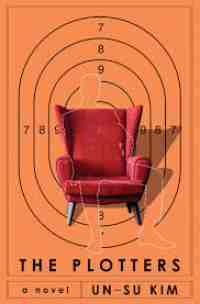
First published in Korea; published in translation by Doubleday on January 29, 2019
If you want someone dead in South Korea, you hire a plotter, who plans the assassination. The plotter gives the plan to a contractor who supplies an assassin. Since the assassin doesn’t know who paid for the murder, that hierarchy protects the person who hires the plotter. And since plotters never use their real name, the police cannot find them even if they catch the assassin and are inclined to climb the hierarchal ladder. That, anyway, is the premise underlying The Plotters.
According to a key character in Un-Su Kim’s novel, everyone who holds any sort of power in South Korea knows a plotter. That key character has a plan to change the system. The novel’s protagonist, Reseng, doesn’t believe the system can be changed, but Reseng is a fatalist.
Reseng is also an assassin. He works for Old Racoon, a librarian who is a long-time contractor. Reseng was adopted and raised by Old Racoon, along with Trainer, who taught him his skills, and Hanja, who is now in competition with Old Racoon.
Reseng taught himself to read in the library. He learned from Achilles the importance of protecting your weak spot. His friend Chu’s weak spot was a young prostitute he decided not to kill. To punish his failure, assassins were hired to kill Chu until he became proactive and decided to take out the assassins. Now someone is trying to kill Reseng. Learning who, and then why, is Reseng’s mission during the novel’s second half. A brewing war between Old Racoon and Hanja also contributes to Reseng’s grief.
Reseng doesn’t have compassion for his victims, but he has a detached curiosity when he interacts with them. Reseng feels a stronger attachment to his cats, Desk and Lampshade, than he feels to any person. He feels no guilt or remorse when he kills, but he comes home drained of energy and purpose. He has an interesting mix of character traits, making him the kind of philosophical protagonist who can carry a crime novel that focuses on the criminal’s point of view.
The story recounts some of Reseng’s backstory, including a former girlfriend and a factory job that could be the story of man anywhere in the world living an ordinary working-class life. Only by living as an ordinary person does Reseng discover his true nature. Ironically, one of his associates strives for ordinariness, to be a person who will go unremembered, because it is the safest way to live. The burning question as the novel progresses is whether Reseng will learn to be ordinary again. Whatever the answer to that question might be, the lesson is that “a life not spent asking yourself what you truly love is a cowardly life.”
The Plotters is interesting for its political perspective, particularly its explanation about how the overthrow of military dictatorships and the rise of democracy might open the door to an assassination industry. The novel is also notable for the complexity of its characters: the assassin-raising librarian who has more respect for the innate knowledge of dogs than he has for human scholarship; the friendless Reseng, whose childhood taught him nothing beyond apathy; deadly women who have humane agendas despite their reliance on murder to achieve their goals.
The mystery behind the apparent attempt to assassinate Reseng is a good one, reflecting Kim’s careful attention to the details of storytelling. Dialog is clever and covers unexpected ground. The ending is unexpected but fitting. The combination of plot, characterization, and philosophy makes The Plotters a good choice for fans of international crime fiction.
RECOMMENDED